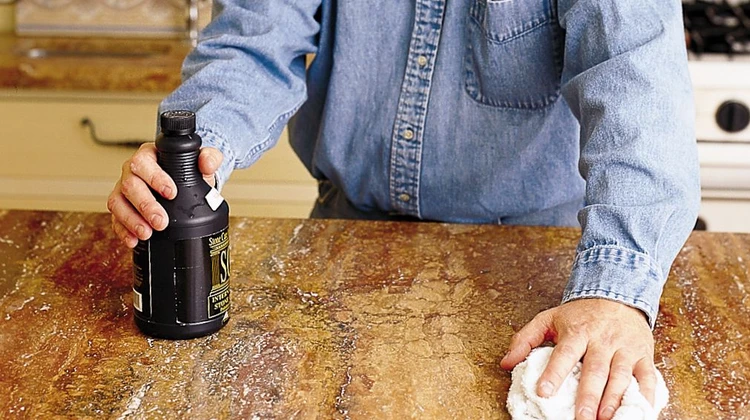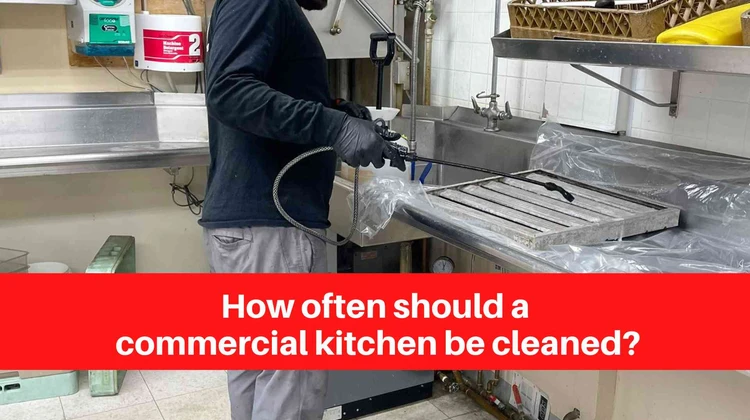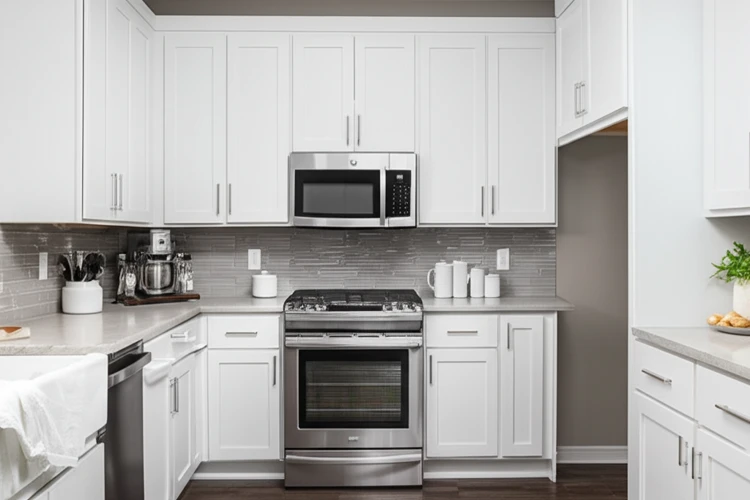Disclaimer: As an Amazon Associate, I earn commission from qualifying purchases.
Kitchen counter stains are a prevalent issue that not only detract from the aesthetics of your kitchen but also pose hygiene concerns. According to a survey by the National Kitchen and Bath Association, nearly 80% of homeowners report dealing with stains on their kitchen counters. Effective stain removal is crucial for maintaining both the visual appeal and cleanliness of your kitchen. This blog aims to provide a comprehensive guide on identifying, removing, and preventing stains on various types of kitchen counter materials.
Common Types of Kitchen Counter Stains
Kitchen counters are susceptible to a variety of stains, each requiring specific removal techniques. Here are some of the most common types:
- Grease: Often from cooking oils and fats, grease stains can be particularly stubborn.
- Coffee: Spilled coffee can leave dark, noticeable stains.
- Wine: Red wine stains are notoriously difficult to remove due to their deep pigmentation.
- Food Coloring: Often found in baking ingredients, food coloring can leave vibrant, hard-to-remove stains.
According to a study published in Home Maintenance Monthly, grease and coffee stains are the most prevalent, affecting over 60% of kitchen counters. Understanding the nature of these stains is the first step in effective removal.
Identifying Your Kitchen Counter Material
The material of your kitchen counter significantly influences the stain removal process. Common materials include:
- Granite: A durable and elegant choice, but susceptible to acidic stains.
- Marble: Known for its luxurious appearance, but can be damaged by acidic substances.
- Quartz: Highly resistant to stains but not immune to them.
- Laminate: Affordable and low-maintenance but can be damaged by heat and sharp objects.
Professional cleaners recommend identifying your countertop material before attempting any stain removal techniques. Industry publications like Kitchen Design Quarterly emphasize the importance of using material-specific cleaning methods to avoid damage.
Essential Cleaning Tools and Products
Having the right tools and products is essential for effective stain removal. Here are some must-haves:
- Microfiber Cloths: Gentle and effective for wiping surfaces.
- Sponges: Ideal for scrubbing tough stains.
- Scrubbers: Useful for deep-cleaning textured surfaces.
For different counter materials, specific cleaning products are recommended:
- Granite and Marble: Use pH-neutral cleaners to avoid etching.
- Quartz: Mild soap and water solutions are typically sufficient.
- Laminate: Avoid abrasive cleaners; opt for gentle, non-acidic solutions.
There is a growing trend towards eco-friendly cleaning products, which are gentler on surfaces and the environment. However, commercial products may be necessary for tough stains.
Step-by-Step Guide to Remove Stains from Kitchen Counters
Removing stains effectively requires a methodical approach. Here’s a step-by-step guide:
- Identify the Stain: Determine the type of stain and the counter material.
- Gather Tools and Products: Collect the necessary cleaning tools and products.
- Test a Small Area: Always test the cleaning solution on a small, hidden area first.
- Apply Cleaning Solution: Use a cloth or sponge to apply the solution to the stain.
- Scrub Gently: Use a scrubber or sponge to gently scrub the stain.
- Rinse Thoroughly: Rinse the area with clean water and dry with a microfiber cloth.
Professional cleaning techniques, as outlined in the International Cleaning Industry Standards, emphasize the importance of gentle scrubbing and thorough rinsing to prevent residue buildup.
Natural vs. Chemical Cleaning Solutions
The debate between natural and chemical cleaning solutions is ongoing. Here’s a comparison:
Natural Cleaning Solutions
- Vinegar: Effective for grease and mild stains but can damage marble and granite.
- Baking Soda: Useful for scrubbing tough stains but can be abrasive.
Chemical Cleaning Solutions
- Commercial Cleaners: Often more effective for tough stains but can be harsh on surfaces.
- Bleach: Powerful for disinfecting but can damage counter materials and is harmful to the environment.
Environmental impact considerations are crucial. Natural solutions are generally safer for the environment, but chemical cleaners may be necessary for deep cleaning.
Best Practices for Stain Prevention
Preventing stains is easier than removing them. Here are some tips:
- Use Coasters: Prevent water rings and stains from drinks.
- Wipe Spills Immediately: Quickly clean up spills to prevent them from setting.
Professional advice from kitchen designers, as featured in Home Decor Magazine, highlights the importance of regular maintenance and quick response to spills.
Advanced Stain Removal Techniques
For tough stains, advanced techniques may be necessary:
- Hydrogen Peroxide: Effective for lightening dark stains but should be used with caution on sensitive materials.
- Poultice Methods: Involves applying a paste mixture to draw out stains from porous surfaces.
Successful stain removal often involves case studies and first-hand testing. For example, a poultice method using a mixture of baking soda and water effectively removed a wine stain from a marble countertop.
Maintaining the Integrity of Your Kitchen Counters
Proper maintenance ensures the longevity of your kitchen counters. Here are some tips:
- Regular Cleaning: Use mild cleaning solutions regularly.
- Avoid Harsh Chemicals: Stick to recommended cleaning products.
Transparent information on maintenance costs is essential. Regular cleaning routines can save on expensive repairs and replacements.
Environmentally Friendly Cleaning Solutions
Eco-friendly cleaning products are gaining popularity. Here are some options:
- Lemon Juice: Natural disinfectant and stain remover.
- Castile Soap: Gentle and effective for general cleaning.
References from environmental protection agencies highlight the benefits of eco-friendly solutions for both health and environmental sustainability.
The Role of Regular Cleaning Routines
Regular cleaning routines are crucial for stain prevention. Professional housekeepers recommend:
- Daily Wipe-Downs: Quickly clean surfaces to remove daily grime.
- Weekly Deep Cleaning: Thoroughly clean counters to remove buildup.
Consistent cleaning routines help maintain the overall hygiene and aesthetics of your kitchen.
Frequently Asked Questions (FAQs)
What are the best natural remedies to remove stains from kitchen counters?
Natural remedies like vinegar, baking soda, and lemon juice are effective for mild to moderate stains. Vinegar is great for grease, while baking soda can scrub away tough stains. Lemon juice acts as a natural disinfectant and stain remover.
Can baking soda damage my kitchen counters?
Baking soda is generally safe for most counter materials but can be abrasive. Avoid using it on delicate surfaces like marble or granite, as it can cause scratches. Always test a small area first.
How often should I clean my kitchen counters to prevent stains?
Clean your kitchen counters daily to remove daily grime and prevent stain buildup. A weekly deep cleaning session is also recommended to maintain overall cleanliness and hygiene.
Are there any stains that are impossible to remove from kitchen counters?
Some stains, like deep-set wine or food coloring, can be very challenging to remove completely. Advanced techniques like hydrogen peroxide or poultice methods may be required, but even these may not guarantee complete removal.
What are the benefits of using eco-friendly cleaning products?
Eco-friendly cleaning products are safer for the environment and your health. They are less likely to cause skin irritations or respiratory issues and contribute to a more sustainable living practice.
Can I use bleach to clean my kitchen counters?
Bleach is a powerful disinfectant but can damage counter materials and is harmful to the environment. It’s best to use bleach sparingly and only on surfaces that can withstand its harshness, like certain types of quartz.
Conclusion
Maintaining clean and stain-free kitchen counters is essential for both aesthetics and hygiene. By understanding the types of stains, using appropriate cleaning techniques, and adopting regular cleaning routines, you can keep your kitchen counters looking their best. Whether you opt for natural or chemical cleaning solutions, the key is to act promptly and use the right tools and methods for your specific counter material. Regular care and maintenance will ensure the longevity and beauty of your kitchen counters.







